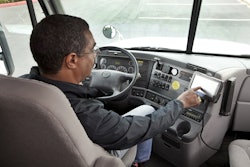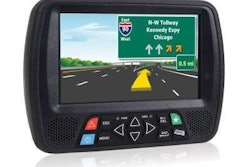The board of directors of the Truckload Carriers Association on Monday, March 14, voted to support legislation and regulations that would mandate the use of electronic logging devices. TCA says the new policy, approved by the board at the association’s Annual Convention in San Diego, is consistent with the industry’s commitment to cooperative measures for ensuring compliance with hours-of-service regulations.
The installation of ELDs, used by motor carriers to ensure compliance and reduce paperwork inefficiencies, is the target of a recent proposal by the Federal Motor Carrier Safety Administration. While TCA now supports the mandatory use of such devices, the association’s new policy specifies several areas for consideration in the development of laws or regulations that would mandate them.
“We believe that this new policy is reflective of today’s operating environment,” says TCA President Chris Burruss. “The board of directors thought it was important that our members lead on this issue.”
The new TCA policy is as follows: “TCA supports federal laws and regulations requiring the use of electronic logging devices (ELD) for documenting compliance with hours of service (HOS) rules. In developing such a law or regulation, TCA believes the following issues should be addressed:
1. ELDs requirements should be based on the minimal, functional and performance specifications necessary to accurately record and report HOS compliance and assure reliability and utility of operation.
2. Except for HOS compliance data, statutory protections should be afforded to motor carriers pertaining to the control, ownership and admissibility/discoverability of data generated and derived from ELDs, and to assure the privacy rights of drivers.
3. Drivers shall be responsible for operating ELDs in full compliance with all applicable regulations.
4. Any ELD regulation must address the operational diversity of the trucking industry, continue existing exceptions to the record of duty status, and consider additional exemptions that balance compliance and the evolving industry diversity.
5. Motor carriers using compliant ELDs should be relieved of the burden of retaining supporting documents for verification of driving time.
6. Any ELD mandate, if instituted, should be made simultaneously applicable to all vehicles of the affected population of motor carriers. It should avoid any implementation inequities identified and take measures to eliminate them.
7. Tax incentives should be pursued as a means to facilitate adoption of ELD systems.”









